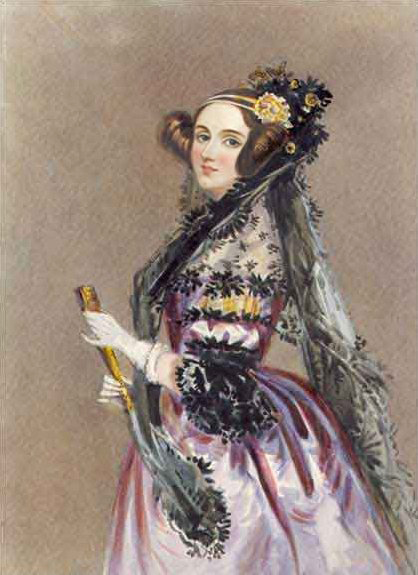Aha. This post shall be brief and unoriginal. But it will not be 詰まらない、I promise. How can I, a girl who had been forced herself to stomach a really boring book inflict the same kind of unpleasantness to select number of people who are willing to read her blog entries?
Nah.
So, any of you know this gentleman?
Yep. Lord Byron. He is indeed handsome, dashing, a poet and noble to boot, insane to some degree - clearly, a man to be pursued by all means in your disposal.
Oh, and he also fathered her.
 |
| A refreshing reminder that a scientist can dress prettily and heavily-laden with lace, if one wants to. |
Ada Lovelace, a woman who helped Babbage constructed the first computer. Her surname reflected her taste in clothes... a bit... I think.
But be very careful. Shameless and unrelenting pursue sometimes end badly. VERY BADLY. The following paragraphs are copied and pasted directly from this Wikipedia page.
From March to August 1812, Lady Caroline embarked on a well-publicized affair with Lord Byron. He was 24 and she 26. She had spurned the attention of the poet on their first meeting, subsequently giving Byron what became his lasting epitaph when she described him as "mad, bad, and dangerous to know." Lady Caroline Lamb claimed she coined the phrase after her first meeting with the poet at a society event in 1812, and this was later reported by her friend, Lady Morgan (in her Memoirs), although as Paul Douglass notes in his biography, there is no contemporary evidence to prove Lady Caroline actually created the famous phrase at the time. Byron's response to her enticements (she wrote him a fan letter), was to visit her because of her high social status as a niece of the Duchess of Devonshire, and then to pursue her passionately.
Lady Caroline and Lord Byron publicly decried each other as they privately pledged their love over the following months. Byron referred to Lamb by the hypocorism "Caro", which she adopted as her public nickname. After Byron broke things off, her husband took the disgraced and desolate Lady Caroline to Ireland. The distance did not cool Lady Caroline's interest in the poet; she and Byron corresponded constantly during her exile.When Lady Caroline returned to London in 1813; however, Byron made it clear he had no intention of restarting their relationship. This spurred increasingly public attempts to reunite with her former lover. Matters came to a head at Lady Heathcote's ball in early July 1813, when Byron publicly insulted Lady Caroline, who responded by breaking a wine glass and trying to slash her wrists. She did not seriously injure herself, and it is most unlikely that she had any suicidal intentions; but polite society was scandalised, and her mental stability was called into question. Byron himself referred to it as a theatrical performance : "Lady Caroline performed the dagger scene".
Lady Caroline's obsession with Byron would define much of her later life, as well as influence both her and Byron's works. They would write poems in the style of each other, about each other, and even embed overt messages to one another in their verse. After a thwarted visit to Byron's home, Lady Caroline wrote "Remember Me!" into the flyleaf of one of Byron's books. He responded with the hate poem; "Remember thee! Remember thee!; Till Lethe quench life's burning stream; Remorse and shame shall cling to thee, And haunt thee like a feverish dream! Remember thee! Ay, doubt it not. Thy husband too shall think of thee! By neither shalt thou be forgot, Thou false to him, thou fiend to me!"
Her cousin Harriet (by then Lady Granville), with whom Lady Caroline's relationship had deteriorated after childhood, visited her in December 1816 and was so incredulous at her unrepentant behaviour that she ended her description of the visit in a letter to her sister with: "I mean my visits to be annual."
Poor, poor lady. What a great fall. How fondness can transform into disgust, contempt, and disdain. I shudder at that. Really.
And that is why one has to tread real carefully. 
No comments:
Post a Comment